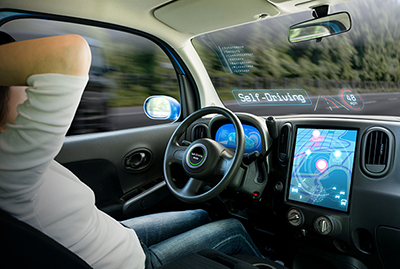
But what does this mean for the automotive industry and how will the insurance market need to adapt to accommodate this new technology? In this bulletin Gallagher’s Automotive team discuss the impact driverless cars could have on our roads.
The benefits of driverless cars
Driverless cars are ultimately positive, creating new freedoms for many and offering independence and better quality of life for the elderly or those who are unable to drive for health reasons. In fact 6/10 people with limited mobility expect an improved quality of life1. Those of us who already drive can instead use the time to work, read or catch up on television. Plus, with 94% of accidents3 on the road caused by human error, autonomous vehicles could transform road safety in the UK with the SMMT estimating that 25,000 serious accidents may be prevented and 2,500 lives saved between now and 20304.
The insurance impact
While the vehicles are not road ready yet, there have already been self-driving pods trialled in Milton Keynes with plans to extend these trials to Greenwich, Bristol and Coventry. The Government believes that in just three years, consumers will be able to buy cars which park on their own and can be used on motorways5. This means that insurance legislation will need to be transformed to accommodate them. The Government recently announced that insurance will be extended to protect victims where the autonomous vehicle causes a crash while in autonomous mode6.
We are a long way from a world of solely driverless cars however, while the SMMT estimates that these cars will be widely available from 2025, by 2030 they will still only make up less than 10% of the motor pool. While motor insurance will still be compulsory, driverless cars are likely to totally transform how car insurance is calculated – removing the need for personal data and to assess individual driver risk. Instead quotes could be based on vehicle behaviour, as in the case of a collision the vehicle would be at fault not the human owner and therefore the claim could be brought against the manufacturer.
Some companies have already begun to consider insurance options, for example Volvo have confirmed they will self-insure their vehicles, while other specialist insurers are already developing policies to protect customers in case of a software hack or failure7. While this may seem excessive, as CAVs will be connected to the internet their manufacturers will need to ensure that they have adequate firewalls to prevent hackers taking over controls or accessing information from personal devices such as a mobile phone attached to the vehicle. There is also a risk that terrorists will use these risks to their advantage, by loading the vehicle with explosives and using remote controlling to guide the vehicle to the desired target.
What about the wider automotive industry?
The truth of the matter is that the industry may scramble to keep up. Laws will have to be changed to accommodate this shift in technology and insurers are yet to determine who will be liable in the event of a RTA (manufacturer or “driver”).
Given the technology will be owned by the car manufacturer and the cost of re-training staff will be high, it is likely the autonomous vehicle market will be led by manufacturers and dealerships. This could impact family-run businesses and independent garages, as the vehicles will require additional expertise and expense. Failing to invest in the training and equipment for these vehicle types could leave garage owners severely exposed, especially from an employer and public liability perspective. For those garages with access to or availability of funding, it would certainly be an opportune time and shrewd move to invest early to stay ahead of the competition, but only if done properly. Otherwise, garages could run the risk of invalidating insurance if claims are made and it’s proved that the garage made a mistake due to insufficient training or inappropriate tools.
The widespread use of CAVs could also spell the end of taxi companies as the need for a driver is made obsolete. With companies like Uber and Lyft already having introduced cashless payments, shared autonomous vehicles could instead be the future, with the vehicle completing a series of jobs before returning to be charged. Lorry drivers could also find themselves without a job, as autonomous vehicles require no extensive training and are immune to the risk that comes with human error. Jobs will also be created though, with the SMMT estimating an additional 320,000 including 25,000 in the automotive manufacturing industry8.
Gallagher: our conclusions
Whilst there are some real benefits for fully autonomous vehicles, the true level of disruption that they could wreak on the automotive market needs to be carefully considered. While they will create freedoms for the less mobile, and in theory make insurance quotes fairer and simpler to calculate, there are also drawbacks to consider. Autonomous vehicles could lead to a shrinking motor aftermarket, especially for small businesses as well as the extinction of taxi and lorry drivers. Considering how soon autonomous cars could be introduced to our roads now is the time to begin carefully considering what changes these vehicles will bring and how your organisation can adapt to this new technology.
Sources
- www.gov.uk/government/news/over-109-million-of-funding-for-driverless-and-low-carbonprojects
- SMMT Summary 2017 – page 23.
- SMMT Position Statement 2017 – page 18.
- www.smmt.co.uk/reports/connected-vehicles
- www.theguardian.com/technology/2018/mar/06/self-driving-cars-in-uk-riding-on-legal-review
- SMMT Position Statement 2017 – page 38.
- www.autoexpress.co.uk/car-tech/85183/driverless-cars-everything-you-need-to-know-aboutautonomous-vehicles
- www.smmt.co.uk/reports/connected-vehicles
- www.gov.uk/government/speeches/driverless-cars-are-the-future-not-science-fiction

